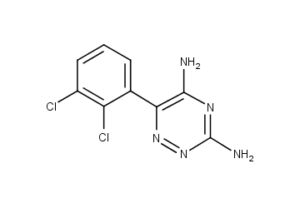Lamotrigine CAS NO 84057-84-1 Inquire about Lamotrigine
Tecoland supplies Lamotrigine bulk active pharmaceutical ingredient (API) to the pharmaceutical industry. Our Lamotrigine is manufactured by cGMP compliant facility. Welcome to contact us for further details including current DMF status for the product and up to date regulatory status of the manufacturing facility. We look forward to assisting you with your research and development projects.
What is Lamotrigine?
Lamotrigine, marketed in the US and most of Europe as Lamictal by GlaxoSmithKline, is an anticonvulsant drug used in the treatment of epilepsy and bipolar disorder. It is also used off-label as an adjunct in treating depression. For epilepsy, it is used to treat focal seizures, primary and secondary tonic-clonic seizures, and seizures associated with Lennox-Gastaut syndrome. Like many other anticonvulsant medications, Lamotrigine also seems to act as an effective mood stabilizer, and has been the first U.S. Food and Drug Administration (FDA)-approved drug for this purpose since lithium, a drug approved almost 30 years earlier. It is approved for the maintenance treatment of bipolar type I.
What is the mechanism of action?
One proposed mechanism of action of Lamotrigine, the relevance of which remains to be established in humans, involves an effect on sodium channels. in vitro pharmacological studies suggest that lamotrigine inhibits voltage-sensitive sodium channels and/or calcium channels, thereby stabilizing neuronal membranes and consequently modulating presynaptic transmitter release of excitatory amino acids (e.g., glutamate and aspartate). Studies on lamotrigine show binding to sodium channels similar to local anesthetics.
How to dose Lamotrigine?
The dose of immediate release lamotrigine for seizures in patients not taking valproic acid (Depakote, Depakote ER, Depakene, Depacon, Stavzor), but taking seizure medications that reduce lamotrigine blood levels (for example, phenobarbitol, phenytoin [Dilantin, Dilantin-125], carbamazepine [Tegretol], primidone) is 50 mg once daily for two weeks, followed by 100 mg daily given in two divided doses for two weeks. Thereafter, the dose is increased by 100 mg daily every 1-2 weeks up to the usual maintenance dose of 300 to 500 mg daily given as a divided dose.
In patients who are taking valproic acid in which it increases blood levels of lamotrigine, the initial dose of lamotrigine is 25 mg every other day for two weeks, then 25 mg once daily for two weeks. After 4 weeks the dose is slowly increased by 25 to 50 mg per day every one to two weeks until a dose of 100 to 400 mg once daily or divided twice daily is reached. The maintenance dose when using extended release tablets is 200 to 600 mg once daily.
The target dose for treating bipolar disorder is 100 to 400 mg daily.
What are the side effects?
The most common side effects reported by patients taking lamotrigine are dizziness, somnolence, headache, double vision, blurred vision, nausea, vomiting, and rash. Severe, life-threatening rashes have occurred with lamotrigine. The risk of rash is increased if the dose is increased faster than recommended or if patients also are taking valproic acid. Patients taking lamotrigine should report any rash to a physician immediately. Multiorgan failure, including fatal liver disease rarely has been observed during lamotrigine treatment.
Storage
Store it at room temperature and away from excess heat and moisture (not in the bathroom).
Disclaimer:
Information on this page is provided for general information purposes. You should not make a clinical treatment decision based on information contained in this page without consulting other references including the package insert of the drug, textbooks and where relevant, expert opinion. We cannot be held responsible for any errors you make in administering drugs mentioned on this page, nor for use of any erroneous information contained on this page.